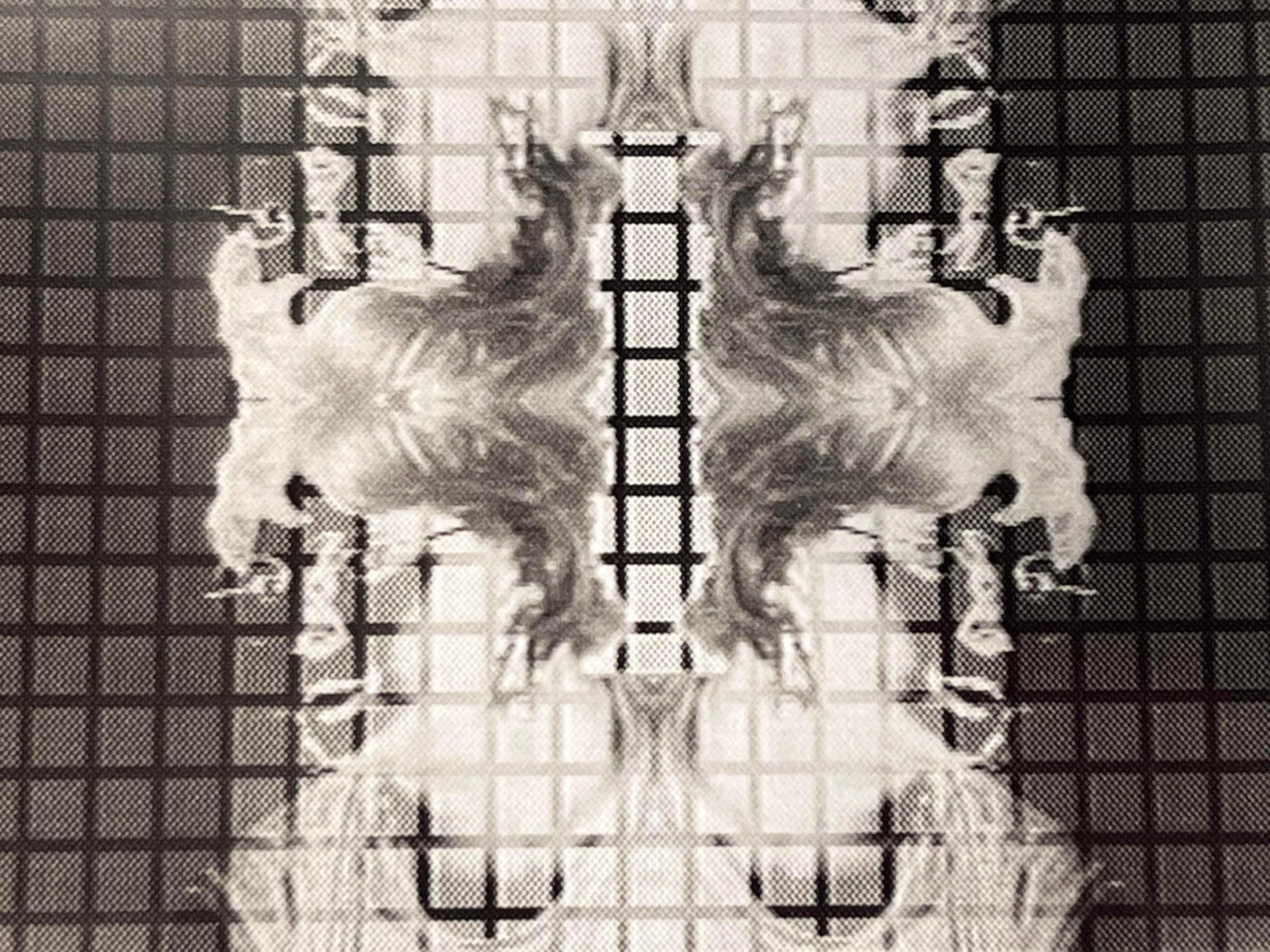One of MCR's Drama Specialists goes to a Conference:
“Navigating Waters: From Oppression to Liberation”- the 27th Pedagogy and Theater of the Oppressed Conference
For those who view theater as a tool for empowerment and social change, Pedagogy and Theater of the Oppressed (PTO) are not foreign terms, however, I wouldn’t want to assume anyone’s knowledge, therefore I’ll start with a brief history.
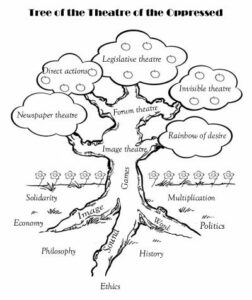
Pedagogy of the Oppressed was coined by the Brazilian pedagogical philosopher and liberatory educator Paulo Freire who believed that education is a reciprocal process and a political act that enables the humanization of the oppressor and the liberation of the oppressed.
In the ’70s, the Theater of the Oppressed was founded by the Brazilian theater practitioner, educator, and political activist Augusto Boal who was radically influenced by the theories of critical pedagogy that Freire developed during the 50’s and the 60’s. The Theater of the Oppressed consists of various practically developed theater methodologies that Boal often organized into systems of trees. Within this metaphorical context, the major branches of his styles and techniques are Forum Theater, Image Theater, Invisible Theater, Rainbow of Desire, Newspaper Theater and Legislative Theater that involve audiences as ‘spect-actors’ or critical and active participants in discussing, representing, deconstructing, and reconstructing the social issues they face, thus building proactive communities.
Both Freire and Boal have a history of engagement in the U.S. academia as well as are advocates of their pedagogical and theatrical methodologies here. Although the two are from Brazil, due to bitter histories of being imprisoned and exiled for their ‘threatening’ practices, the first and only time they co-appeared on a public platform to reflect on liberatory education was at the Second Annual Pedagogy of the Oppressed Conference in Omaha, in March 1996.
The fact that the Pedagogy and Theater of the Oppressed Conference held its 27th annual gathering at Eckerd College in St. Petersburg, Florida this end of spring, is a testament to the impact of PTO in theater making as well as social engagement across the U.S.
The conference as well as the pre and post workshops related to it are organized by the PTO board members and volunteers who do this out of sheer love and belief in Freire’s and Boal’s discoveries. Some of the workshop leaders are Boal’s students, translators and even his son, Julian Boal, who held a three-day post conference workshop on ‘Forum Theatre: Devising and Jokering.’ While Julian Boal vehemently practices his father’s theater methodologies, he is also probably one of the biggest challengers of them. According to him, his father set a platform, but he wanted the practitioners of the Theater of the Oppressed to forward and adjust his methods to the contemporary needs and not apply them as facsimiles.
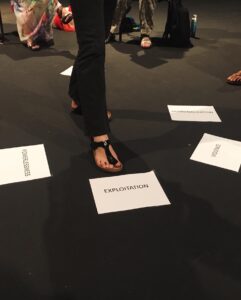
This year was my first time attending the PTO Conference and I am restlessly eager to continue following this critically important event in its future conventions. The theme of the conference “Navigating Waters: From Oppression to Liberation” is defined by the conference organizers (according to their website) as a reference to the contemporary dangers the immigrants face crossing perilous waterways in search of safety and the frontline communities impacted by climate catastrophe. It acknowledges the historical struggles for justice of the enslaved and usurped ancestors and the power of water to connect, cleanse, sustain, and give life.
I went to the conference with the mindset of a devised performance and theater educator and practitioner, wanting to gain a more hands-on practice, which is exactly what the conference offered. While various branches of Boal’s theatrical styles and techniques were presented, the main goal of the workshops provided during the conference was to practice them, undoubtedly the most effective way of learning.
Below, I will mention a few of the workshops and all-conference presentations that I attended, constantly carrying the fear of missing out due to multiple alluring sessions taking place in parallel. It was always a hard choice to decide what to attend, although catching up with other participants who went to different sessions added to the element of socializing and networking.
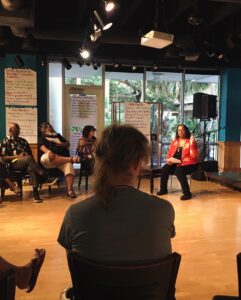
Mark Weinberg from the Center for Applied Theatre in Milwaukee, WI, held a one-day pre workshop focused on exploring and negotiating power as well as relinquishing control. Although these largely heavy weighing concepts were explored, through utilizing Boal’s as well as Weinberg’s own games, the workshop contained so much joy and liveliness which unquestionably are characteristics that come into play through the medium of theater.
During a two-part session, Julie Wells elaborated on her topic ‘Sociodrama: Navigating Oppression in Traditional Children’s games’, a workshop that not only explored the violent aspects of children’s games such as dodgeball, but also recognized the efforts of teachers, often on the edge of burnout, determined to navigate through the complexity of inclusive, compassionate and present-day teaching.
Denver-based non-profit Mirror Image Arts offered an interactive two-part session delving into the pedagogy and praxis of Restorative Theater, a set of tools they utilize for deconstructing, restoration, and healing in schools, detention centers, and professional development.
Another inspiring workshop on the legacy of the freedom fighters in challenging oppressive systems was brought through ‘Practical Approaches to ‘Deep Equity’ and ‘Liberatory Leadership’ with Kaye Craft and Debra Alexander, who among others brought up her activism during the Selma Marches.
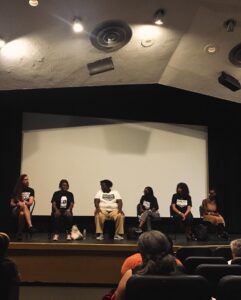
Some of the all-conference sessions included talks with the freedom and safety geared non-profit, Dream Defenders, the pedagogical coordinator of Escola de Teatro Popular, Julian Boal, the professional Latinx theater organization, working at the intersection of Latinx, immigrant, and LGBTQ+ identities, Descolonizarte TEATRO (Desco), to mention just a few.
The conference also offered a great non-formal avenue to meet other practitioners of devised theater and PTO. “This conference is a platform for sharing knowledge, experiences, and building new coalitions”- is what the PTO website states, and it truly is.
Everyone who operates along similar lines in invited to support this initiative by hosting future conferences and/or presenting their work through “proposals for workshops and panels that actively engage participants in practical, hands-on exercises, critical dialogues, and performances; explore stories of resilience, community empowerment, and diverse strategies for understanding and acting in the world”.[1]
I came out of the conference with a lot of hope gained thanks to the conference organizers, presenters and participants, nonprofit organizations and communities, tirelessly working to improve the lives of those in the margins of our society and make their voices, their stories heard. “If your voice is not being heard, then we have a situation of oppression”- said Mark Weinberg during his one-day workshop, and this gives us enough incentive to strive for the opposite.
I feel inspired and somewhat trauma washed, as many of the practices we did (and we did a ton) included recalling situations of power or powerlessness that we have experienced. The exercises and games also had the potential to put us in the shoes of our students, constituents, collaborators, leaders, oppressors, and the conference lecturers were able to foster a safe space for sharing vulnerable stories which were carefully held and sympathetically embraced.
Here’s the Pedagogy and Theater of the Oppressed website which contains more information on how you can engage in the future! I highly recommend it to anyone working in the intersection of theater/performance and community engagement!
https://ptoweb.org
[1] https://ptoweb.org/25443-2/
- About the Author
- Latest Posts
Fjolla Hoxha is a writer, theater & drama critic, and performance maker from Prizren/Kosova, newly based in Nashville. Her artistic practice is rooted on assiduous research that grounds on critical theory, cultural studies, oral histories and narratives, institutional and personal archives. Aside from being a writer, Fjolla works as a cross-media performance artist, focused on site-specificity and audience participation. She has collaborated with various artists, collectives and institutions based in Europe and the U.S. and her work has been staged and stage-read in Kosova, Finland, Switzerland, Germany, UK while her plays and reviews have also been published in Greece and New York.

